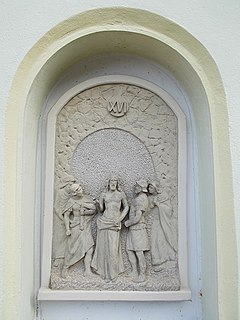
Adventism is a branch of Protestant Christianity which was started in the United States during the Second Great Awakening when Baptist preacher William Miller first publicly shared his belief that the Second Coming of Jesus Christ would occur at some point between 1843 and 1844.

Sabbath in Christianity is the inclusion or adoption in Christianity of a Sabbath day. Established within Judaism through Mosaic Law, Christians inherited a Sabbath practice that reflected two great precepts: the commandment to "remember the sabbath day, to keep it holy" and God's blessing of the seventh day (Saturday) as a day of rest in the Genesis creation narrative and declared as made for man by Jesus. The first of these provisions was associated in Judaism with the assembly of the people to worship in the Temple in Jerusalem or in synagogues.

This article is about the demographic features of the population of Tonga, including population density, ethnicity, education level, health of the populace, economic status, religious affiliations and other aspects of the population.

A religious denomination is a subgroup within a religion that operates under a common name, tradition, and identity.
In secular usage, religious education (RE) is the teaching of a particular religion and its varied aspects: its beliefs, doctrines, rituals, customs, rites, and personal roles. In Western and secular culture, religious education implies a type of education which is largely separate from academia, and which (generally) regards religious belief as a fundamental tenet and operating modality, as well as a prerequisite for attendance.

A church service is a formalized period of Christian communal worship, often held in a church building. It often but not exclusively occurs on Sunday, or Saturday in the case of those churches practicing seventh-day Sabbatarianism. The church service is the gathering together of Christians to be taught the 'Word of God' and encouraged in their faith. Technically, the "church" in "church service" refers to the gathering of the faithful rather than to the building in which it takes place. In most Christian traditions, services are presided over by clergy wherever possible.
Rabbinic Judaism, also called Rabbinism, has been the mainstream form of Judaism since the 6th century CE, after the codification of the Babylonian Talmud. Growing out of Pharisaic Judaism, Rabbinic Judaism is based on the belief that at Mount Sinai, Moses received from God the Written Torah (Pentateuch) in addition to an oral explanation, known as the "Oral Torah," that Moses transmitted to the people.

Sabbath desecration is the failure to observe the Biblical Sabbath, and is usually considered a sin and a breach of a holy day in relation to either the Jewish Shabbat, the Sabbath in seventh-day churches, or to the Lord's Day (Sunday), which is recognized as the Christian Sabbath in first-day Sabbatarian denominations.

The Lord's Day in Christianity is generally Sunday, the principal day of communal worship. It is observed by most Christians as the weekly memorial of the resurrection of Jesus Christ, who is said in the canonical Gospels to have been witnessed alive from the dead early on the first day of the week. The phrase appears in Rev. 1:10.

The Seventh-day Adventist Church had its roots in the Millerite movement of the 1830s to the 1840s, during the period of the Second Great Awakening, and was officially founded in 1863. Prominent figures in the early church included Hiram Edson, James Springer White, Joseph Bates, and J. N. Andrews. Over the ensuing decades the church expanded from its original base in New England to become an international organization. Significant developments such the reviews initiated by evangelicals Donald Barnhouse and Walter Martin, in the 20th century led to its recognition as a Christian denomination.

Religion in Sweden is diversified. Christianity was the religion of virtually all of the Swedish population from the 12th to the early 20th century, but it has rapidly declined throughout the late 20th and early 21st century. In 2015, legally registered Christians comprised 69.9% of the total population.

Samuele R. Bacchiocchi was a Seventh-day Adventist author and theologian, best known for his work on the Sabbath in Christianity, particularly in the historical work From Sabbath to Sunday, based on his doctoral thesis from the Pontifical Gregorian University. He was also known within the Seventh-day Adventist church for his opposition to rock and contemporary Christian music, jewelry, the celebration of Christmas and Easter, certain dress standards and alcohol.

The seventh-day Sabbath, observed from Friday evening to Saturday evening, is an important part of the beliefs and practices of seventh-day churches.

Biblical Sabbath is a weekly day of rest or time of worship given in the Bible as the seventh day. It is observed differently in Judaism and Christianity and informs a similar occasion in several other faiths. Though many viewpoints and definitions have arisen over the millennia, most originate in the same textual tradition of "Remember the sabbath day, to keep it holy".

Sabbatarianism is a view within Christianity that advocates the observation of the Sabbath, in keeping with the Ten Commandments. Its historical origins lie in early Christianity, later in the Eastern Church and Irish Church, and then in Puritan Sabbatarianism, which delineated precepts for keeping Sunday, the Lord's Day, holy in observance of Sabbath commandment principles. This observance of Sunday as a day of worship and rest is the purest form of first-day Sabbatarianism, a view which was historically heralded by nonconformist denominations, such as Congregationalists, Presbyterians, Methodists, and Baptists, as well as many Episcopalians. The impact of first-day Sabbatarianism on Western culture is manifested by influences that remain today, such as Sunday blue laws.
The Lord's Day Alliance is an ecumenical Christian first-day Sabbatarian organization, based in the United States and Canada that was founded in 1888 by mainstream Christian denominations. These Churches worked together to found the Lord's Day Alliance in order to effect change in the public sphere, specially with respect to "lobbying for the passage of Sunday-rest laws." The Lord's Day Alliance publishes a quarterly magazine called Sunday.













